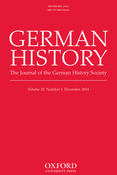Year: 2015
Helen's article 'Surviving Stunde Null: Narrating the fate of Nazi elite-school pupils during the collapse of the Third Reich', has recently been published in the December 2015 issue of German History.
The article was also awarded the periodical's "Best Article of 2015 Prize".Read more...
Helen and Dr Katharina Karcher were recently interviewed by Victoria Craw of the Australian News Corporation, in conjunction with a film-screening and panel discussion which they hosted at the Cambridge Festival of Ideas on Friday 30 October.Read more...
On 30 October 2015, Helen took part in a film-screening and panel discussion centred around Andres Veiel's award-winning film Der Kick (2006), along with Dr Katharina Karcher, Dr Jeffrey Murer, and Dr Emmanuel Karagiannis. The event formed part of this year's Cambridge Festival of Ideas.Read more...
On 28 October 2015, Helen and Dr Katharina Karcher were interviewed on Chris Mann's 'Drivetime' show on BBC Radio Cambridgeshire, in conjunction with a film-screening and panel discussion which they hosted at the Cambridge Festival of Ideas on Friday 30 October.Read more...
 German History journal "Best Article of 2015 Prize"
German History journal "Best Article of 2015 Prize"Helen's article 'Surviving Stunde Null: Narrating the fate of Nazi elite-school pupils during the collapse of the Third Reich', forthcoming in German History journal, has just been awarded the periodical's "Best Article of 2015 Prize".
The prize, which is awarded by the journal's editorial board, is intended to showcase outstanding work from scholars of German history, whatever their career stage.Read more...
 'Surviving Stunde Null: Narrating the fate of Nazi elite-school pupils during the collapse of the Third Reich'
'Surviving Stunde Null: Narrating the fate of Nazi elite-school pupils during the collapse of the Third Reich'German History 33 (4), 2015, pp. 570-87. Winner of German History journal's "Best Article of 2015" prize.
This paper considers the experiences of one particular, rarely-discussed group of 'war children': former pupils of the Napolas – the most prominent type of Nazi elite-school. Drawing upon a variety of original testimonies, the paper explores the hardships and dilemmas which Napola-pupils faced as World War II drew to a close, and the ways in which former pupils have constructed this aspect of their past.Read more...
Helen's review of Jason Crouthamel's monograph An Intimate History of the Front: Masculinity, Sexuality, and German Soldiers in the First World War (2014) has just been published in Reviews in History.Read more...
 Second Book Project: The Third Reich's Elite Schools – A History of the Napolas
Second Book Project: The Third Reich's Elite Schools – A History of the NapolasThe Nationalpolitische Erziehungsanstalten (National-Political Education Institutes), known as Napolas for short, were the most prominent type of elite school in Nazi Germany. Founded in 1933 as a birthday present for Hitler, these boarding-schools, which educated pupils from the age of 10 upwards, were intended to train the future elite of the Third Reich in all walks of life.
A monograph based on this research project, entitled The Third Reich's Elite Schools: A History of the Napolas, has now been published by Oxford University Press.Read more...
 Further favourable reviews of 'Sparta's German Children'
Further favourable reviews of 'Sparta's German Children'A favourable review of Helen's monograph, Sparta's German Children: The ideal of ancient Sparta in the Royal Prussian Cadet Corps, 1818-1920, and in National Socialist elite schools (the Napolas), 1933-1945, has recently been published in the journal Zeitschrift für Religions- und Geistesgeschichte.
'[This] highly readable and precisely-argued volume vividly demonstrates the ways in which clichés of humanistic education can be combined with totalitarian viewpoints...'Read more...
 PhD Research Project: Personal and Political Appropriations of Sparta in German Elite Education during the 19th and 20th Centuries
PhD Research Project: Personal and Political Appropriations of Sparta in German Elite Education during the 19th and 20th CenturiesAncient Sparta was particularly prized as a paradigm for Prusso-German military elite-education during the 19th and 20th centuries. Analysis of two case-studies, the Royal Prussian Cadet-Corps and the Napolas, has demonstrated that generations of future German officers and putative Nazi leaders were trained to see a 'Spartan' way of life as their ultimate aspiration.
A monograph based on this research project, entitled Sparta's German Children. The ideal of ancient Sparta in the Royal Prussian Cadet-Corps, 1818-1920, and in National Socialist elite schools (the Napolas), 1933-1945, was published in 2013 by the Classical Press of Wales.Read more...
